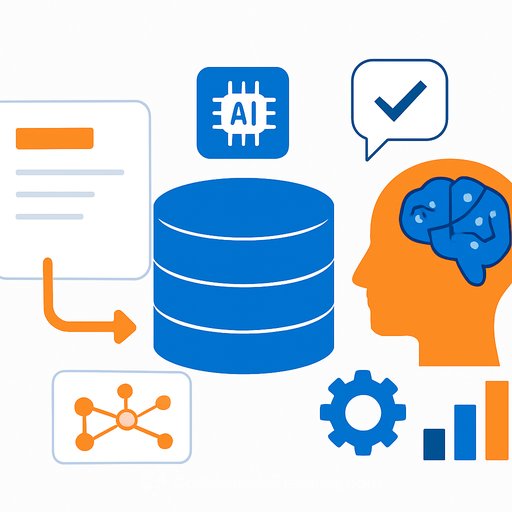New book explores logical data management for AI readiness
Denodo and O'Reilly have released The Rise of Logical Data Management: An Essential Data Strategy for Transforming Your Business in the Age of AI. Written by Christopher Gardner of the University of Michigan, the book makes a clear case for placing a logical data layer at the center of enterprise AI strategy.
The message is straightforward: AI needs governed, trusted, secure, real-time data. Traditional warehouses, lakes, and lakehouses are valuable, but alone they rarely deliver that standard at scale.
What logical data management is
Logical data management connects data sources virtually to create a centralized, AI-ready data layer-without copying or moving data. It adds uniform security and governance, exposes data as products through a central marketplace, and unifies disparate systems into a common format.
As Gardner explains, this approach builds on the existing stack and gives leaders a consistent way to control access, enforce policy, and deliver data quickly across teams and tools.
Why it matters to leadership now
AI initiatives stall when data is fragmented, stale, or over-governed by manual gates. A logical layer reduces friction without sacrificing control, so teams and AI agents can find, understand, and use data on demand.
- Governance and security applied once, enforced everywhere
- A universal semantic layer that translates data into business language
- Real-time and near-real-time access across multiple sources
- Self-service for analysts, product teams, and AI applications
Industry reaction
"Denodo has long championed the 'logical-first' approach to managing data. Organisations are spending time and money on moving, storing, and maintaining persisted data, even when it is not necessary. In addition, a logical approach exposes new forms of data to multiple users, AI agents, and AI applications, to support a wide range of use cases, including real-time use cases. This book validates our approach and explains how it works for data leaders as well as technically savvy business stakeholders," said Alberto Pan, executive vice president and chief technical officer at Denodo.
"It was a real eye-opener for me to do the research for this book. Logical data management is a promising strategy, offering a flexible, straightforward way to simplify access to all sorts of information across the organization, and make it ready for self-service and AI," said Christopher Gardner.
Kate Strachnyi, founder of DATAcated, added: "My favorite line was: 'You can think of a logical data layer as a library, where you have access to the knowledge it contains without having to obtain your own copy of every book.' If you care about data access, governance, or how AI will actually scale in the enterprise, this book is definitely worth your time."
Paul Weiskopf, Advisory Board Member for Denodo, noted: "It's not just about managing data, it's about empowering data to be a decisive tool for achieving customer satisfaction, operational excellence, and innovative breakthroughs."
How enterprises are using it
- Supplementing existing warehouses, lakes, and lakehouses with a logical layer to meet real-time and self-service needs
- Standardizing access with a semantic layer so both humans and AI agents consume consistent definitions
- Reducing duplication and data sprawl by virtualizing access rather than copying data into every tool
Practical playbook for leaders
- Define "AI-ready" data standards: governance, lineage, quality thresholds, and PII controls
- Inventory sources and latency needs; decide what to virtualize vs. what truly requires physical movement
- Establish a universal semantic layer and business glossary tied to KPIs
- Pilot two or three high-impact use cases (e.g., real-time customer insights, supply signals, AI copilots)
- Track outcomes: time-to-data, reuse rate of data products, query performance, and reduction in duplicate datasets
- Set operating model basics: data product owners, federated governance, and a change process for definitions
Who should read it
C-level leaders, data executives, and business owners who need faster decision cycles, more reliable KPIs, and scalable AI. The book combines technical foundations with business benefits, including impact on customer experience, operational efficiency, performance, and scalability.
Access
Denodo is providing complimentary access to the book via its website.
Exploring more AI reading paths? See our curated picks here: AI books.
Your membership also unlocks:






